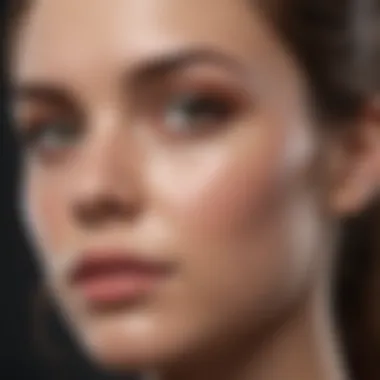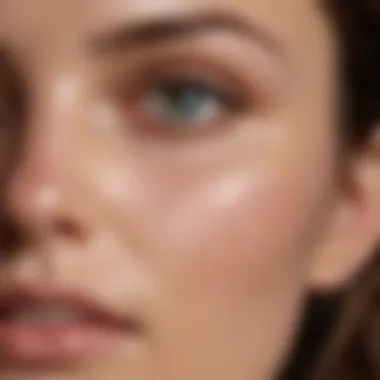Mineral vs. Chemical Sunscreen: Choosing the Ideal Option for Acne-Prone Skin


Beauty Tips and Tricks
When it comes to selecting the right sunscreen for acne-prone skin, the choice between mineral and chemical sunscreens can significantly impact your skincare routine. Understanding the differences in ingredients, formulation, and how they influence acne is key to making an informed decision for your skin's health.
Mineral Sunscreen
Mineral sunscreens, also known as physical sunscreens, typically contain active mineral ingredients like zinc oxide or titanium dioxide. These minerals create a physical barrier that reflects and scatters UV rays away from the skin. This can be beneficial for those with sensitive skin or acne, as mineral sunscreens are less likely to clog pores or cause irritation.
Chemical Sunscreen
On the other hand, chemical sunscreens work by absorbing UV rays and converting them into heat, which is then released from the skin. Common chemical sunscreen ingredients include oxybenzone, avobenzone, and octocrylene. While effective in protecting against sun damage, some individuals with acne-prone skin may find that certain chemical filters exacerbate breakouts due to potential pore-clogging properties.
In the following sections, we will delve deeper into the specific ingredients present in mineral and chemical sunscreens, the formulation differences, and how each type of sunscreen can impact acne-prone skin. By breaking down these key components, you will gain valuable insights into which type of sunscreen aligns best with your skincare needs.
Introduction
In the realm of skincare, the choice between mineral and chemical sunscreens holds significant weight, particularly for individuals battling acne. Selecting the right sunscreen can make a pivotal difference in skin health and appearance. The discussion on mineral versus chemical sunscreens traverses beyond mere protection from UV rays; it extends into the realm of acne management and overall skincare efficacy, making it a critical consideration for anyone striving for optimal skin wellness. Understanding the nuances of these two sunscreen types is paramount for curating an effective acne-fighting skincare regimen.
Understanding Sunscreen Types
Before delving into the comparison between mineral and chemical sunscreens, it is crucial to grasp the fundamental disparities between these two categories of sun protection. Mineral sunscreens, often known as physical sunscreens, rely on active mineral ingredients like zinc oxide and titanium dioxide to create a barrier on the skin's surface, reflecting and scattering UV rays. On the contrary, chemical sunscreens contain organic compounds such as oxybenzone and avobenzone that work by absorbing UV radiation and converting it into heat, which is then released from the skin. By discerning the mechanisms and compositions of these sunscreen types, individuals can make informed choices tailored to their skincare needs.
Impact of Sunscreen on Acne
The relationship between sunscreen and acne is intricate, as improper sun protection can exacerbate existing skin conditions. Understanding how sunscreen interacts with acne-prone skin is imperative for maintaining skin clarity and health. Mineral sunscreens, with their non-comedogenic properties and anti-inflammatory benefits, are generally favored for acne-prone individuals as they are less likely to clog pores or trigger breakouts. On the other hand, chemical sunscreens, while effective in sun protection, may pose a higher risk of pore-clogging and skin irritation in acne-prone individuals. By comprehending the impact of sunscreen on acne, individuals can tailor their skincare routine to promote clearer, healthier skin.
Purpose of the Comparison


The comparison between mineral and chemical sunscreens serves a vital purpose in helping individuals navigate the vast array of sunscreen options available in the market. By elucidating the distinct benefits and drawbacks of each sunscreen type concerning acne-prone skin, this analysis empowers readers to make informed decisions aligned with their skincare goals. Whether prioritizing non-comedogenic formulations, anti-inflammatory properties, or lightweight textures, understanding the purpose of this comparison enables individuals to select sunscreen varieties that best complement their skin needs and acne management efforts.
Mineral Sunscreen
Mineral sunscreen is a pivotal topic in this article as it plays a crucial role in determining the most suitable sun protection for acne-prone skin. Compared to chemical sunscreens, mineral sunscreens utilize active ingredients like zinc oxide and titanium dioxide, offering a physical barrier rather than chemical absorption. The composition and characteristics of mineral sunscreen set it apart, providing potential benefits and considerations that are essential for those with acne-prone skin to ponder.
Composition and Characteristics
Main Ingredients: Zinc Oxide, Titanium Dioxide
The main ingredients of zinc oxide and titanium dioxide are key components of mineral sunscreen formulations. These ingredients are renowned for their ability to reflect and scatter UV rays, acting as a physical barrier on the skin. This characteristic is highly advantageous as it reduces the risk of irritation and sensitivity often associated with chemical filters. Although these ingredients may leave a faint white cast, their efficacy in sun protection makes them a preferred choice for individuals with acne-prone skin.
Physical Barrier Protection
The physical barrier protection offered by mineral sunscreen is a standout feature. Unlike chemical sunscreens that absorb UV rays, mineral sunscreens sit on the skin's surface, effectively blocking and deflecting harmful radiation. This mechanism provides a sturdy defense against sun damage without penetrating the skin or causing potential irritation. While the visible presence of the product may deter some users due to its thicker texture, the enhanced protection it offers makes it a compelling option for acne-prone individuals.
Suitability for Sensitive Skin
The suitability of mineral sunscreen for sensitive skin is a significant advantage. Due to the inert nature of zinc oxide and titanium dioxide, mineral sunscreens are less likely to trigger adverse reactions in individuals with sensitive skin. This gentle formulation reduces the risk of inflammation or breakouts, making it an attractive choice for those prone to acne. Despite the slight inconvenience of potential staining on clothes, the compatibility of mineral sunscreen with sensitive skin reaffirms its value for dermatological concerns.
Chemical Sunscreen
In this section, we delve into the importance of Chemical Sunscreen in our exploration of Mineral vs. Chemical Sunscreen for acne-prone skin. Chemical Sunscreens contain active ingredients like Oxybenzone, Avobenzone, and Octinoxate, which play a crucial role in protecting the skin from harmful UV rays. These ingredients work by absorbing the UV radiation before it can penetrate the skin deeply, providing a lightweight and easy-to-apply option for daily sun protection. Understanding the specific elements and benefits of Chemical Sunscreen is vital in making an informed choice for skincare routines.
Ingredients and Mechanism of Action
Common Ingredients: Oxybenzone, Avobenzone, Octinoxate
Exploring the common ingredients Oxybenzone, Avobenzone, and Octinoxate reveals their role in chemical sunscreen formulations. Oxybenzone effectively absorbs UVB rays, while Avobenzone provides broad-spectrum UVA protection. Octinoxate, on the other hand, contributes to the overall stability of the sunscreen. These ingredients enhance the efficacy of Chemical Sunscreen in shielding the skin from sun damage. However, some concerns surround their potential impact on skin health, making it crucial to weigh their advantages and disadvantages in the context of this comparison.


Chemical Absorption of UV Rays
Chemical Absorption of UV Rays is a fundamental aspect of how Chemical Sunscreens function. By absorbing UV radiation, these sunscreens prevent it from penetrating deep into the skin layers, reducing the risk of sunburn and long-term skin damage. The ability to absorb and neutralize UV rays efficiently is a key advantage of Chemical Sunscreens, but it is essential to also consider any drawbacks associated with prolonged exposure to these chemicals.
Lightweight Formulation
The Lightweight Formulation of Chemical Sunscreens is a highly favored feature among users who value ease of application and wearability. Unlike Mineral Sunscreens, Chemical variants are typically lighter in texture, making them more comfortable to wear daily. The lightweight nature of these sunscreens makes them suitable for everyday use, promoting consistent sun protection without feeling heavy or greasy on the skin.
Impact on Acne-Prone Skin
Potential Irritation
One consideration when using Chemical Sunscreens on acne-prone skin is the potential for skin irritation. Some individuals may experience sensitivity or redness due to the active ingredients present in these sunscreens. It is essential to assess how your skin reacts to specific chemicals and formulations to avoid exacerbating acne or other skin conditions.
Pore-Clogging Risk
Another aspect to be mindful of is the Pore-Clogging Risk associated with Chemical Sunscreens. Certain ingredients in these sunscreens could potentially block pores, leading to breakouts or exacerbating existing acne. Understanding the comedogenicity of these formulas is key to preventing pore blockages and maintaining clearer skin.
Allergic Reactions
Allergic Reactions are also a consideration for individuals using Chemical Sunscreens. Some people may be sensitive to certain chemical compounds present in these sunscreens, manifesting as redness, itching, or rashes on the skin. Determining any allergic tendencies beforehand can help in selecting suitable products that minimize the risk of adverse reactions.
Advantages and Disadvantages
Ease of Application
One of the significant advantages of Chemical Sunscreens is their Ease of Application. The fluid consistency and quick absorption make them popular choices for those seeking a fuss-free sun protection solution. The ease of application ensures that individuals are more likely to apply sunscreen consistently, promoting better skin health and sun protection compliance.
Minimal Residue


Chemical Sunscreens are known for their Minimal Residue post-application. Unlike Mineral Sunscreens, which can leave a visible white cast on the skin, Chemical variants blend in seamlessly, leaving behind minimal residue. This feature enhances the aesthetic appeal of Chemical Sunscreens, making them suitable for daily use under makeup or alone.
Chemical Sensitivities
Finally, it is crucial to consider Chemical Sensitivities when opting for Chemical Sunscreens. Some individuals may have allergies or sensitivities to certain chemical components found in these formulations. Being mindful of potential sensitivities helps in selecting suitable products that minimize the risk of adverse skin reactions, ensuring a positive experience with Chemical Sunscreens.
Choosing the Right Sunscreen
In the realm of skincare, selecting the appropriate sunscreen is critical for maintaining healthy and radiant skin. The process of choosing the right sunscreen involves considering various factors that cater to individual needs and preferences. Different skin types react differently to sunscreen components; therefore, understanding these distinctions is paramount. An insightful examination of the mineral and chemical sunscreens helps in determining the best fit for acne-prone skin.
Factors to Consider
Skin Sensitivity
Skin sensitivity plays a pivotal role in sunscreen selection due to its direct impact on how the skin reacts to different formulations. Individuals with sensitive skin require sunscreens with gentle ingredients that do not trigger adverse reactions. Considering skin sensitivity ensures the chosen sunscreen caters to specific needs, avoiding potential irritations or allergies. Embracing sunscreens tailored for sensitive skin significantly reduces the risk of discomfort or skin reactions.
Acne Severity
Acne severity influences the choice of sunscreen as certain formulations may exacerbate existing skin conditions. Understanding the implications of sunscreen on acne severity is crucial for managing breakouts effectively. Selecting a sunscreen that does not aggravate acne is vital in maintaining clear and healthy skin. By assessing acne severity, individuals can opt for sunscreens that support their skincare goals without compromising skin health.
Personal Preferences
Personal preferences shape sunscreen selection by considering individual routines, textures, and application methods. Preferences such as scent, texture, and application ease impact the overall experience of using sunscreen daily. Tailoring sunscreen choices to personal preferences enhances consistency in application and ensures adherence to skincare routines. By aligning with personal preferences, individuals can establish a sustainable sunscreen regimen that complements their lifestyle and skincare objectives.
Consulting with Dermatologist
Seeking guidance from a dermatologist is invaluable in navigating the vast landscape of sunscreens. Dermatologists offer expert advice on selecting sunscreens based on skin type, concerns, and specific requirements. Consulting with a dermatologist provides personalized recommendations that address individual skin concerns and goals. Dermatological insights help in making informed decisions regarding sunscreen choices, maximizing skin benefits and minimizing potential adverse effects.
Conclusion
In the realm of skincare, the significance of determining the most suitable sunscreen for acne-prone skin cannot be understated. Our exploration into this dichotomy between mineral and chemical sunscreens has illuminated crucial aspects that influence the decision-making process of individuals grappling with acne concerns. By deciphering the differences in ingredients, formulation, and the impact these types of sunscreens have on acne, readers are empowered to make informed choices regarding their skincare regimens. Understanding the nuances between mineral and chemical sunscreens can lead to improved skin health and confidence, aligning closely with the overarching objective of preserving and enhancing one's skin.
Final Thoughts
As we wrap up our in-depth analysis of mineral versus chemical sunscreens and their implications for acne-prone skin, it becomes evident that tailored skincare routines are imperative for addressing specific skin concerns, including acne. The final verdict on whether mineral or chemical sunscreen reigns supreme for acne-prone skin may vary depending on individual skin types, sensitivities, and preferences. Consequently, consulting with trusted dermatologists or skincare professionals is a prudent step towards customizing a sunscreen regimen that harmonizes well with personalized skincare needs. By merging theoretical knowledge with practical application, readers can embark on a journey towards achieving optimal skin health and well-being, ultimately fostering a sense of empowerment and confidence in their skincare choices.







